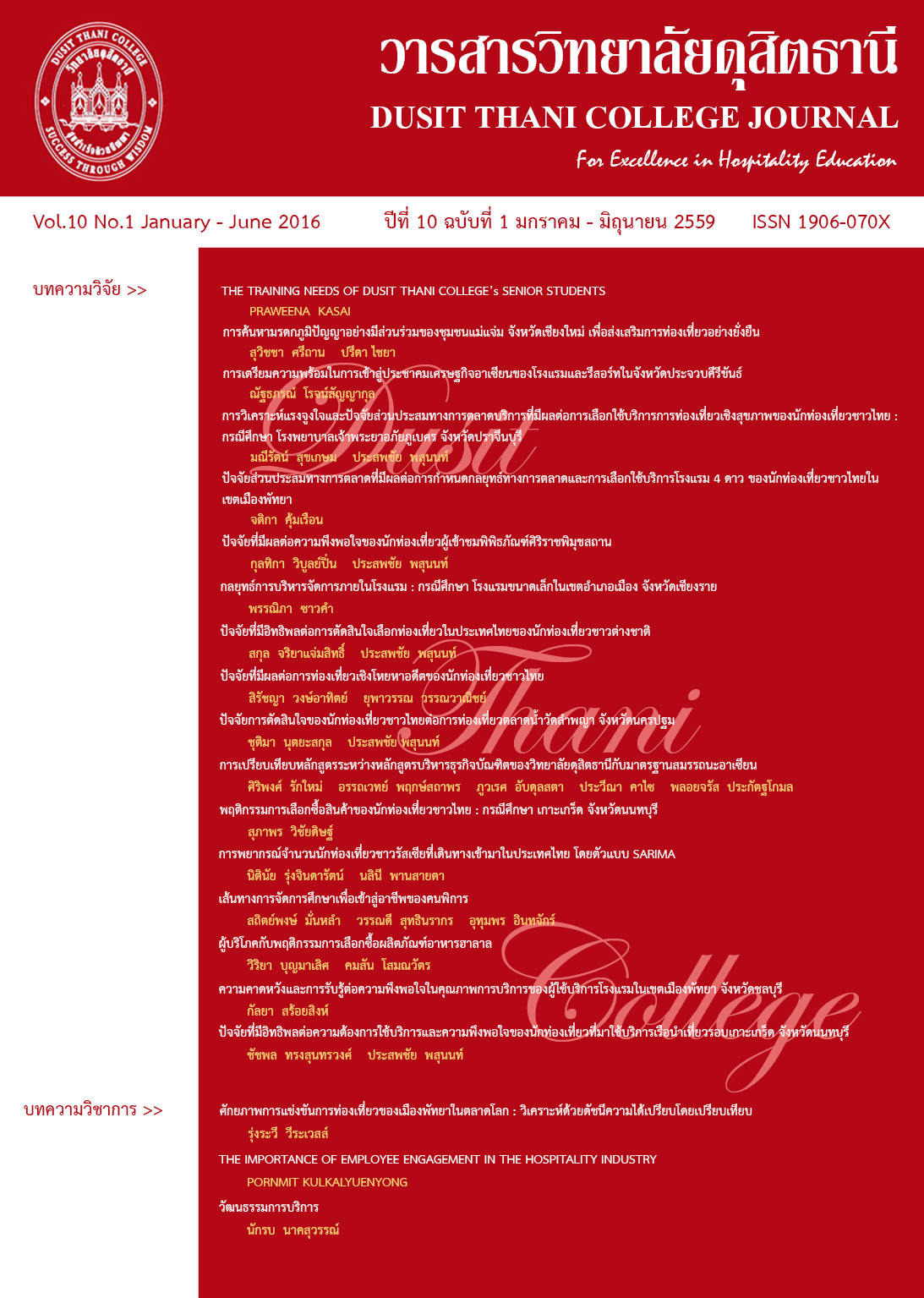วัฒนธรรมการบริการ
Main Article Content
บทคัดย่อ
วัฒนธรรมการบริการ คือ การสร้างรูปแบบของการบริการให้เป็นแนวทางในการทำงานให้เป็นแบบเดียวกันขององค์กร เพื่อให้เกิดการบริการที่มีคุณภาพและดีเยี่ยมสำหรับลูกค้า ส่งผลทำให้ลูกค้าเกิดความรู้สึกประทับใจและกลับมาใช้บริการในครั้งต่อไป มีผลต่อภาพลักษณ์และรายได้ขององค์กรด้วย แนวทางในการสร้างวัฒนธรรมการบริการ คือ ต้องวางเป้าหมาย มีผู้สนับสนุน ทำความเข้าใจกับบุคลากร อบรมและฝึกฝน ทดลองใช้ในสถานการณ์จริง ประเมินผลและประกาศเป็นแนวทางขององค์กรหรือธุรกิจต่อไป หลังจากนั้นต้องดูแลและปรับปรุงให้การบริการสามารถดำเนินต่อไปอย่างราบรื่นและทันต่อเหตุการณ์ปัจจุบัน เมื่อมีผลตอบรับที่ดีจากแนวทางการบริการที่สร้างขึ้นก็ทำการสืบทอดต่อคนอื่นจนกลายเป็นวัฒนธรรมขององค์กรต่อไป
Article Details
รูปแบบการอ้างอิง
Nakrob Narksuwan น. . น. (2018). วัฒนธรรมการบริการ. วารสารวิทยาลัยดุสิตธานี, 10(1), 283–295. สืบค้น จาก https://so01.tci-thaijo.org/index.php/journaldtc/article/view/136619
ประเภทบทความ
บทความวิชาการ
นโยบายการพิจารณากลั่นกรองบทความ
- บทความวิจัยและบทความวิชาการทุกเรื่องที่จะได้รับการตีพิมพ์ต้องผ่านการพิจารณากลั่นกรองโดยผู้ทรงคุณวุฒิ (Peer Review) ในสาขาที่เกี่ยวข้อง จำนวน 3 ท่าน/บทความ
- บทความ ข้อความ ภาพประกอบและตารางประกอบที่ลงตีพิมพ์ในวารสารเป็นความคิดเห็นส่วนตัวของผู้เขียน กองบรรณาธิการไม่จำเป็นต้องเห็นด้วยเสมอไป และไม่มีส่วนรับผิดชอบใด ๆ ถือเป็นความรับผิดชอบของผู้เขียนแต่เพียงผู้เดียว
- บทความที่จะได้รับการตีพิมพ์จะต้องไม่เคยตีพิมพ์ เผยแพร่ที่ใดมาก่อน และไม่อยู่ระหว่างการพิจารณาของวารสารฉบับอื่น หากตรวจสอบพบว่ามีการตีพิมพ์ซ้ำซ้อน ถือเป็นความรับผิดชอบของผู้เขียนแต่เพียงผู้เดียว
- บทความใดที่ผู้อ่านเห็นว่าได้มีการลอกเลียนหรือแอบอ้างโดยปราศจากการอ้างอิง หรือทำให้เข้าใจผิดว่าเป็นผลงานของผู้เขียน กรุณาแจ้งให้กองบรรณาธิการวารสารทราบจะเป็นพระคุณยิ่ง
เอกสารอ้างอิง
กองบรรณาธิการ. (2558). การสร้างวัฒนธรรมองค์กรใน 5 ขั้นตอน. (ออนไลน์). เข้าถึงได้จาก http://incquity.com/articles/5-steps-create-corporate-culture วันที่เข้าถึง 12 มิถุนายน 2558.
จารุวรรณ ประดา. (2545). ความสัมพันธ์ระหว่างปัจจัยส่วนบุคคล วัฒนธรรมองค์การ ลักษณะสร้างสรรค์ ความพร้อมขององค์การกับความยึดมั่นผูกพันขององค์การ ตามการรับรู้ของ พยาบาลวิชาชีพโรงพยาบาลจิตเวช. วิทยานิพนธ์ปริญญามหาบัณฑิต สาขาการบริหารการพยาบาล จุฬาลงกรณ์มหาวิทยาลัย.
จินตนา บุญบงการ. (2539). การสร้างจิตสำนึกการให้บริการกับการปรับปรุงบริการภาครัฐ. กรุงเทพฯ :ฟอร์แมทพริ้นติ้ง.
บรรเทิง พาพิจิตร. (2532). ประเพณี วัฒนธรรมไทย และคติความเชื่อ. กรุงเทพฯ : โอเดียนสโตร์.
เลิฟล็อค, คริสโตเฟอร์ เอช และไรท์, ลอเรน. (2546). การตลาดบริการ [Principles of Service Marketing and Management]. (อดุลย์ จาตุรงคกุล, ดลยา จาตุรงคกุลและพิมพ์เดือน จาตุรงคกุล, ผู้แปล). กรุงเทพฯ : เพียร์สัน เอ็ดดูเคชัน อินโดไชน่า.
สัญญา สัญญาวิวัฒน์. (2523). ทฤษฎีสังคมวิทยา. คณะรัฐศาสตร์ จุฬาลงกรณ์มหาวิทยาลัย.
__________.(2523). หลักสังคมวิทยา. กรุงเทพฯ : ไทยวัฒนาพานิช.
พิสิทธิ์ พิพัฒน์โภคากุล. วัฒนธรรมบริการ (Service Culture). (ออนไลน์). เข้าถึงได้จาก http://www.impressionconsult.com/web/index.php/articles/160-serviceculture.htmt วันที่เข้าถึง 16 มิถุนายน 2558.
_______________. ค่านิยมหลักในการให้บริการ (Core Service Value). (ออนไลน์). เข้าถึงได้จาก http://www.impressionconsult.com/web/index.php/articles/160-service culture. htmt วันที่เข้าถึง 18 มิถุนายน 2558.
Talcott Parsons. Structural. Functional theory. (ออนไลน์). เข้าถึงได้จาก https://en.wikipedia.org/wiki/Structural_functionalism วันที่เข้าถึง 18 มิถุนายน 2558.
วีระรัตน์ กิจเลิศไพโรจน์. (2548). การตลาดธุรกิจบริการ. กรุงเทพฯ : ซีเอ็ดยูเคชั่น จำกัด (มหาชน).
จารุวรรณ ประดา. (2545). ความสัมพันธ์ระหว่างปัจจัยส่วนบุคคล วัฒนธรรมองค์การ ลักษณะสร้างสรรค์ ความพร้อมขององค์การกับความยึดมั่นผูกพันขององค์การ ตามการรับรู้ของ พยาบาลวิชาชีพโรงพยาบาลจิตเวช. วิทยานิพนธ์ปริญญามหาบัณฑิต สาขาการบริหารการพยาบาล จุฬาลงกรณ์มหาวิทยาลัย.
จินตนา บุญบงการ. (2539). การสร้างจิตสำนึกการให้บริการกับการปรับปรุงบริการภาครัฐ. กรุงเทพฯ :ฟอร์แมทพริ้นติ้ง.
บรรเทิง พาพิจิตร. (2532). ประเพณี วัฒนธรรมไทย และคติความเชื่อ. กรุงเทพฯ : โอเดียนสโตร์.
เลิฟล็อค, คริสโตเฟอร์ เอช และไรท์, ลอเรน. (2546). การตลาดบริการ [Principles of Service Marketing and Management]. (อดุลย์ จาตุรงคกุล, ดลยา จาตุรงคกุลและพิมพ์เดือน จาตุรงคกุล, ผู้แปล). กรุงเทพฯ : เพียร์สัน เอ็ดดูเคชัน อินโดไชน่า.
สัญญา สัญญาวิวัฒน์. (2523). ทฤษฎีสังคมวิทยา. คณะรัฐศาสตร์ จุฬาลงกรณ์มหาวิทยาลัย.
__________.(2523). หลักสังคมวิทยา. กรุงเทพฯ : ไทยวัฒนาพานิช.
พิสิทธิ์ พิพัฒน์โภคากุล. วัฒนธรรมบริการ (Service Culture). (ออนไลน์). เข้าถึงได้จาก http://www.impressionconsult.com/web/index.php/articles/160-serviceculture.htmt วันที่เข้าถึง 16 มิถุนายน 2558.
_______________. ค่านิยมหลักในการให้บริการ (Core Service Value). (ออนไลน์). เข้าถึงได้จาก http://www.impressionconsult.com/web/index.php/articles/160-service culture. htmt วันที่เข้าถึง 18 มิถุนายน 2558.
Talcott Parsons. Structural. Functional theory. (ออนไลน์). เข้าถึงได้จาก https://en.wikipedia.org/wiki/Structural_functionalism วันที่เข้าถึง 18 มิถุนายน 2558.
วีระรัตน์ กิจเลิศไพโรจน์. (2548). การตลาดธุรกิจบริการ. กรุงเทพฯ : ซีเอ็ดยูเคชั่น จำกัด (มหาชน).


